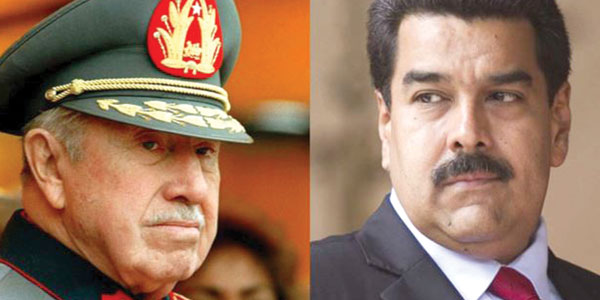
A dictatorship is a dictatorship — it doesn’t matter if it’s a right-wing or a left-wing government. This is because all dictators, regardless of their politics or which country they happen to lead, want power first and foremost; they will torture and kill to keep it, then lie to cover up their crimes.
It should come as no surprise, then, that there are striking similarities between Gen. Augusto Pinochet, leader of the military junta that governed Chile in the 1970s and ’80s, and Nicolás Maduro, the current dictator of socialist Venezuela. It also follows that there’s no reason the same kind of resilient and resolute opposition that eventually forced Pinochet from power couldn’t also bring down Maduro.
I get it. Some people — particularly “Chavistas” and other Latin American leftists — find this comparison irritating. And it’s true that there are many differences, both historical and ideological, between Pinochet and Maduro.
Nonetheless, they both led brutally repressive regimes, and are accountable for thousands of deaths. On this, no one can disagree.
The first time I drew attention to the similarities between Pinochet and Maduro, on Twitter, the Chavistas screamed bloody murder. They simply can’t seem to fathom how deeply Maduro’s abuses and those of his predecessor, Hugo Chávez, have affected Venezuela. Sadly, millions of Venezuelans now know as well as anyone that dictators are all the same — particularly when it comes to their willingness to banish or kill their opponents.
By an extraordinary coincidence, Michelle Bachelet, Chile’s former president, was assigned to establish two commissions: one to investigate the abuses committed during Pinochet’s military rule, between 1973 and 1990, and another (in her current capacity as United Nations high commissioner for human rights) to investigate abuses committed by Maduro’s government following Chávez’s death in March 2013. As it turns out, some of the conclusions drawn in the two reports seem interchangeable.
Shortly before the end of her first presidential term in 2010, Bachelet established the commission on Pinochet — officially called the Presidential Advisory Commission for the Acknowledgment of the Victims of Enforced Disappearance, Politically Motivated Execution, and Political Imprisonment and Torture — to continue the work of previous investigating bodies, including the Rettig and Valech commissions.
As detailed in its report, the commission added more names to the official list of the dictatorship’s victims (which includes those who were killed, imprisoned or tortured, or who suffered other kinds of political violence), bringing the total to just over 40,000. Of these, roughly 3,000 were murdered or disappeared by the Pinochet regime, most of them because of their political activities.
The commission also confirmed that it had been the government’s policy under Pinochet to commit human rights violations.
But enough about Chile. Let’s turn our attention to Venezuela.
Maduro is responsible for many more politically motivated murders than Pinochet. “In 2018, the government registered 5,287 … killings” that were classified as “resistance to authority,” according to a report by the Office of the United Nations High Commissioner for Human Rights. (This is an official figure. The Venezuelan Observatory of Violence, a local nonprofit, reports a far higher number of killings that year.)
The report arrives at a startling conclusion: “Information analyzed by OHCHR suggests many of these killings may constitute extrajudicial executions.”
This means that political violence claimed more lives in Venezuela in just one year than it did throughout the entire Chilean dictatorship (1973-1990). Just one year! According to some estimates, roughly 200,000 Chileans went into exile during the Pinochet regime. In contrast, the U.N. estimates that over 4 million Venezuelans have fled their country so far, with most leaving since the end of 2015.
It’s impossible to assess the full impact of a dictatorship on a single country, in part because the burden is passed along from one generation to the next. Many Venezuelan expatriates have described to me the excruciating pain of leaving their homeland to start over somewhere else. And all because one man turned to violence to hold on to his power and stay in office, an office he acquired unlawfully.
The report on Pinochet’s Chile concludes with the words “we hope this new step will help stop anything like this from ever happening again.”
I hope one day we can say the same about Venezuela.
De Pinochet a Maduro
Una dictadura es una dictadura. No importa si es de derecha o de izquierda. Y los dictadores, por definición, acumulan el poder, torturan, matan y luego mienten sobre sus crímenes. Todos son iguales. En tal sentido, hay odiosas similitudes entre el dictador chileno, Augusto Pinochet, y el actual dictador venezolano, Nicolás Maduro. Y no hay, por lo tanto, ninguna razón por la cual no se deba luchar contra la dictadura venezolana con la misma fuerza y convicción que la usada para sacar del poder a Pinochet.
Entiendo que esta comparación irrita mucho, particularmente a los chavistas y a algunos miembros de la izquierda latinoamericana. Sí, Pinochet fue un sanguinario militar golpista y sus diferencias históricas e ideológicas con Maduro son muchas. Pero los dos han estado al frente de regímenes brutalmente represivos y son responsables de miles de muertes. Eso es imposible negarlo.
La primera vez que presenté la idea en Twitter de que había puntos de comparación entre Pinochet y Maduro, los chavistas pusieron el grito en las redes. No pueden ver el enorme daño que los abusos de Hugo Chávez y Nicolás Maduro le han hecho a Venezuela. Pero, para desgracia de millones de venezolanos, los dictadores se parecen. Sobre todo en sus intenciones de desaparecer y matar a sus opositores.
Por esas extrañas coincidencias de la historia, Michelle Bachelet fue responsable de iniciar dos comisiones que investigaron los abusos cometidos durante la dictadura militar de Pinochet — del 11 de septiembre de 1973 al 10 de marzo de 1990 — y, también (en su cargo actual como alta comisionada de las Naciones Unidas para los derechos humanos), durante el gobierno de Nicolás Maduro, a partir la muerte de Chávez en marzo del 2013. Y algunas de las conclusiones de esos dos informes podrían ser intercambiables.
Poco antes de terminar su primer mandato como mandataria de Chile, Bachelet estableció en el 2010 la Comisión Presidencial Asesora para la Calificación de Detenidos Desaparecidos, Ejecutados Políticos y Víctimas de Prisión Política y Tortura. Esa comisión retomó y agregó a los datos de otras investigaciones, incluyendo las de la Comisión Rettig y la Comisión Valech.
La conclusión del informe es que en Chile hubo más de 40 mil víctimas — las que fueron asesinadas, encarceladas o torturadas, o sometidas a otra forma de violencia política — de la dictadura. De las 40 mil personas, alrededor de 3.000 están muertas o desaparecidas, y la mayor parte de las ejecuciones estuvieron directamente vinculados a la represión política. El informe también encontró que “el país sufrió entre 1973 y 1990 una política de Estado en materia de violaciones de derechos humanos”.
Hasta aquí Chile. Ahora veamos lo que está pasando en Venezuela.
El número de asesinados por razones políticas durante la dictadura de Maduro sobrepasa, por mucho, las cifras de la dictadura pinochetista. “En el 2018 el gobierno registró 5.287 muertes violentas” por “resistencia a la autoridad”, según el informe de la Alta Comisionada de Naciones Unidas para los Derechos Humanos. Y su conclusión es brutal: “La información analizada por el ACNUDH indica que muchas de esas muertes violentas pueden constituir ejecuciones extrajudiciales”. (Estas son cifras oficiales. El Observatorio Venezolano de Violencia, una organización sin ánimo de lucro, tiene números mucho más altos.)
Comparemos.
El número de muertos por la violencia política en Venezuela en un solo año (2018) es superior al de toda la dictadura chilena (1973-1990). Y aún nos faltan por contar otros años. Durante la dictadura de Pinochet se exiliaron alrededor de 200 mil chilenos, según algunos cálculos. Mientras la ONU estima que más de 4 millones de venezolanos han emigrado a otros países en los últimos años.
Es imposible medir el daño total que causa una dictadura en un país. Se carga por generaciones. A mí, personalmente, me ha tocado conversar con muchos venezolanos esparcidos en el mundo sobre el dolor de dejar su casa y su país y empezar de cero en otro lugar. Y todo porque un hombre se rehúsa violentamente a dejar un puesto que no le corresponde.
El informe sobre los abusos en Chile acaba así: “Concluimos señalando que tenemos la esperanza de que este nuevo paso ayude a que nunca más estos hechos vuelvan a ocurrir entre nosotros”.
Algún día, espero, podremos decir lo mismo de Venezuela.









